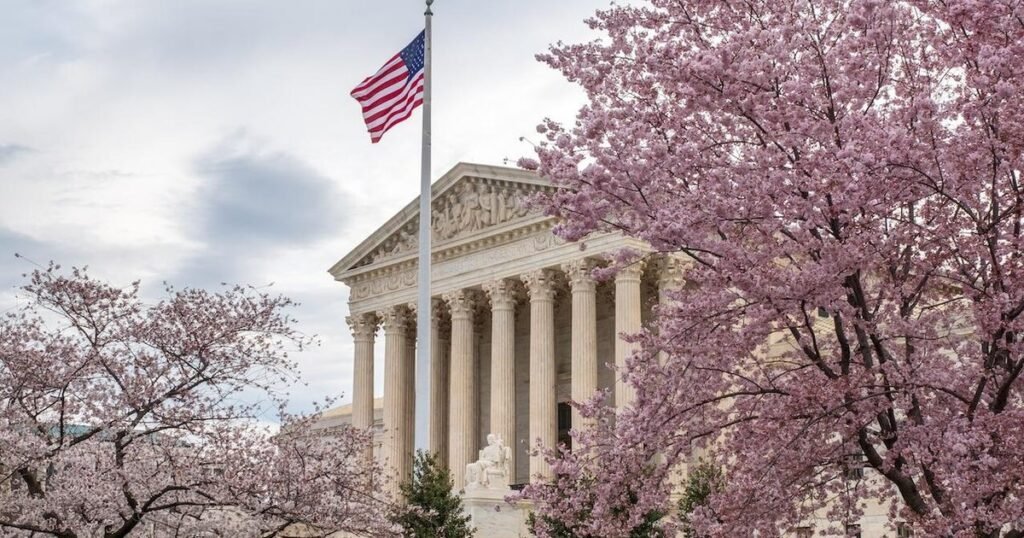Washington — The Supreme Court on Monday turned away a challenge to Maryland’s ban on so-called assault weapons, leaving intact a lower court ruling that upheld the law.
In declining to review the decision from the U.S. Court of Appeals for the 4th Circuit, the high court skirts a fight over whether the Second Amendment allows states to regulate the rifles that have been used in a wave of mass shootings. Justices Clarence Thomas, Samuel Alito and Neil Gorsuch disagreed with the Supreme Court’s decision to turn away the case.
The Supreme Court had already turned away the legal battle over Maryland’s law last year because a federal appeals court had yet to rule. But the U.S. Court of Appeals for the 4th Circuit upheld the measure last August, finding that weapons like the AR-15 could be banned in part because they are outside the scope of the Second Amendment.
Maryland’s prohibition on certain semiautomatic rifles was enacted in the wake of the 2012 shooting at Sandy Hook Elementary School in Newtown, Connecticut. Under the law, it is a crime to possess, sell, transfer or purchase an “assault long gun” or a “copycat weapon,” which encompasses 45 specific guns or their analogues. A variety of semiautomatic handguns and rifles are still allowed, according to the Maryland State Police.
In addition to Maryland, nine other states and the District of Columbia have enacted laws restricting semiautomatic weapons.
A group of Maryland residents who want to buy rifles covered by the ban, a licensed gun dealer in the state and several pro-Second Amendment groups challenged the law in 2020, arguing that they have a Second Amendment right to own common assault rifles.
The federal district court and U.S. Court of Appeals for the 4th Circuit upheld the law, likening the banned firearms to the M-16 rifle, which the Supreme Court has said is outside the scope of Second Amendment protection.
The Maryland challengers asked the Supreme Court to review that decision, and the high court put consideration on hold while it decided another gun case involving concealed carry rules in New York. In that ruling issued in June 2022, the Supreme Court laid out a framework under which gun laws must be consistent with the nation’s historical tradition of firearms regulation.
That decision has led lower courts to invalidate several long-standing gun restrictions found not to meet the so-called history-and-tradition test.
Following its decision in that landmark gun case, the Supreme Court sent the challenge to Maryland’s assault weapons back to the appeals court to reconsider the case.
After applying that new framework to Maryland’s ban, the 4th Circuit concluded last year that the assault weapons ban is constitutional. Focusing on the AR-15 in particular, the appeals court found that it is most useful in military service and can be banned consistent with the Second Amendment.
It also rejected the challengers’ contention that because the guns covered by Maryland’s ban are commonly used, they are protected by the Constitution. Instead, the 4th Circuit said adopting this argument would mean that any dangerous weapon “could gain constitutional protection merely because it becomes popular before the government can sufficiently regulate it.”
The appeals court also said that the ban is consistent with the nation’s historical tradition of firearms regulation, as it “is one of many in a storied tradition of legislatures perceiving threats posed by excessively dangerous weapons and regulating commensurately.”
The challengers again sought the Supreme Court’s review, arguing in a filing that the justices should “ensure that the Second Amendment itself is not truncated into a limited right to own certain state-approved means of personal self-defense.”
They argued the AR-15 is the most popular rifle in the U.S. and said the 4th Circuit’s ruling “turns a firearm possessed for lawful purposes by millions of Americans into an item with not even presumptive constitutional protection.”
But Maryland officials urged the court to leave the 4th Circuit’s ruling intact, in part because they said it’s too soon for the Supreme Court to intervene.

